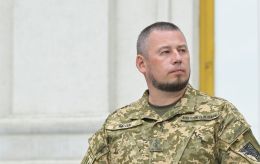'There is no Ukraine fatigue in Denmark,' Danish Ambassador Ole Egberg Mikkelsen
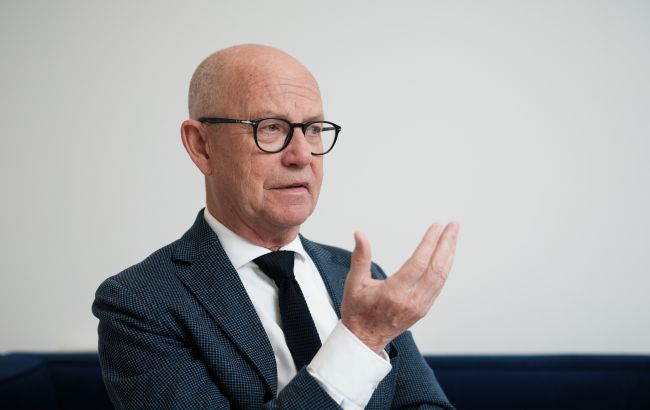 Photo: Ole Egberg Mikkelsen, Ambassador of the Kingdom of Denmark to Ukraine (All photos: Vitalii Nosach/RBC-Ukraine)
Photo: Ole Egberg Mikkelsen, Ambassador of the Kingdom of Denmark to Ukraine (All photos: Vitalii Nosach/RBC-Ukraine)
Danish Ambassador to Ukraine Ole Egberg Mikkelsen discussed in an interview with RBC-Ukraine why Denmark is actively helping Ukraine and specifically the Mykolaiv region, the threat from Russia, the supply of F-16 jets, and control over the funds allocated to Ukraine.
Before the interview with Ambassador Mikkelsen in Kyiv, the air raid alarm sounded once again during the day – hence why we had to have the interview in an improvised shelter.
Denmark plays a significant role in reducing the amount of air raids in Ukraine. The F-16 aircraft, which Denmark is soon to deliver among other things, will become an important component of Ukrainian air defense. Currently, in the embassy hall, there are two LEGO models of F-16 displayed – one of the most famous Danish companies in the world. The delivery of actual aircraft, as the ambassador reiterated, is expected as early as this summer.
Comparatively small Denmark, according to the calculations of the Kiel Institute for the World Economy, ranks second in the world after Estonia in terms of the ratio of aid provided to Ukraine to its GDP. In absolute terms, this amounts to approximately 6 billion euros.
In addition to the F-16s and many other armaments, Denmark made a significant gesture last year by transferring all 19 Caesar howitzers it had purchased to Ukraine. The country also actively supports humanitarian efforts, for several years now, by assisting the Mykolaiv region and the front line – in this regard, the Scandinavian country sets an example for others.
Contents
- On aid to Ukraine and common values
- On F-16s and Caesars delivery
- Mykolaiv support and corruption risks
- Russia's threat to NATO
On aid to Ukraine and common values
– Denmark does not share common borders with Ukraine, it is also quite far away from Russia, and in general, it does not belong to the largest military powers of Europe. At the same time, your country began to actively support us from the beginning of the full-scale invasion of Ukraine and keeps increasing its support to this day. What is the reason for this?
– I think there are several reasons. Probably the most important one is that despite the geographical distance (and you're right, it's 1,600 kilometers away), despite the cultural, and linguistic differences, there are certain things we have in common, and I think that's the values. What unites Danes and Ukrainians – we share the same fundamental values.
That's my lesson after having been here for some years that Danes and Ukrainians are valuing the same things. Freedom, democracy, human rights. They want to live in a decent country. This is why you had your Revolution of dignity because back in 2014 many Ukrainians felt that living in a nation where corruption was systematic even at the highest level, was not dignified. I think this idea about having dignity, being proud of being in your country, respecting the elected leaders, and knowing that human rights prevail, I think that is what unites us.
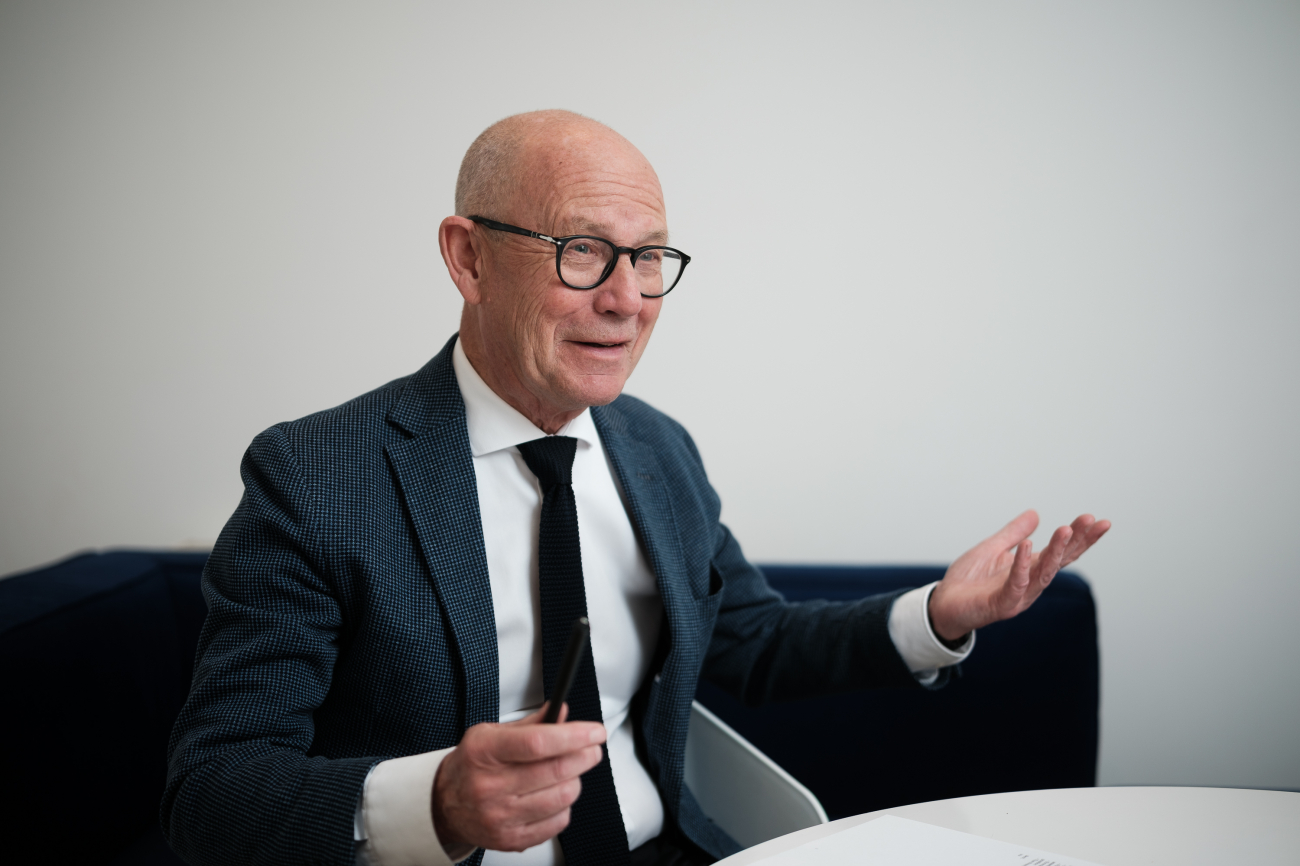
So that's one thing and then probably there is some historical background because at least the Danes in my generation who lived through the Cold War, they remember when we were a frontline state. So if you wind back time to the Cold War, Denmark was 40 kilometers from East Germany. So we knew that if something would have happened, we would be first in line.
Then luckily (and I think all those of us who experienced this, sigh of relief), suddenly the front line moved, and then when the Baltic states and Poland and the other newcomers to NATO joined the alliance suddenly the front line was much further away. But many Danes still remember the time when we were a frontline state.
Now the front line has moved further to the east. But we still need to show solidarity with those who are now the frontline states and I think that's probably what many Danes are thinking. And they basically know that your freedom is also our freedom, if you're going to lose your freedom, we're going to lose ours as well.
I can tell you there is no Ukraine fatigue in Denmark, even after two years. It's quite remarkable because in certain countries people are at least divided, but you will meet very few Danes, if any, who are saying, okay, now it's enough, let's get to the table of negotiations and finish it.
– So your society and your political leadership are all united in this, aren't they?
– We have many delegations coming here (to Ukraine - ed.). Last week we had two delegations. So it's a destination for many Danish politicians and not only ministers from the government are coming, but also lawmakers, and they come from different parties. And this was exactly their message, they said: look, on many issues we are divided, we have different views but on one particular issue we are on the same page and that's Ukraine.
We don't have any parties in our parliament saying: this is enough, now Ukraine needs to sue for peace. Nobody is saying that.
On F-16s and Caesars delivery
– You said recently that everything's going according to the plan with the delivery of the F-16s and that the jets are expected to come as soon as this summer. Will these jets be ready for immediate combat missions or will they need any further modernization?
– Well I'm probably not the right person to ask that question because I'm a civilian, I'm a diplomat. I'm not very familiar with the technicalities but I can quote my Prime Minister who was in Ukraine, in Lviv recently, she was asked the same question and she said they would arrive this summer. She did not specify which month. I can only refer to what she said.
Of course, it's complicated in the sense that it's not only a question of the aircraft, that's just one part of it. There's the whole system of support, maintenance, and ground crews, making sure that the aircraft is operational. It's a huge task and I had the privilege of meeting some of the Ukrainian pilots at an airbase in Denmark back in August last year when your president came to Denmark. I had the honor to be there as well and I met with some of the pilots and the ground crews and I can tell you they are very, very eager to start.
So I'm optimistic, I'm sure that they will arrive soon and they will hopefully soon be operational.
– Denmark transferred all its Caesar howitzers to Ukraine. In addition, your country financed the production of a certain number of new howitzers. Can we talk about any specific timelines for them to come to Ukraine and how many of them will arrive?
– I would be hesitant to go into any kind of details because that's of course classified and that's something that the enemy would be interested in. We don't have anything left, everything that we have was donated and the philosophy is that you need them more than we do. At this point, the front line is in Ukraine and that's why you need them more than we do. We would need something to replace them. I know that discussions are ongoing on what kind of systems should be acquired.
Mykolaiv support and corruption risks
– How much has Denmark spent on supporting Mykolaiv and the region since the beginning of the full-scale invasion? What specific projects regarding assistance to the Mykolaiv region are now a priority? And why Mykolaiv?
– You probably know the background and the reason why we have assumed the patronage – because your president spoke online to our parliament back in March 2022, this was at the darkest hour of the Russian aggression, the Russians were basically at the gates of the city. So in his speech, he urged Denmark to assume the patronage and our Prime Minister came here a couple of weeks later and accepted this.
And your President also added that Mykolaiv is known as the city of shipbuilders. And then I knew exactly why Denmark was chosen because, before the full-scale Russian invasion, we had been working on a maritime project that was aiming at building naval vessels on a shipyard in Mikolaiv, and at the same time modernizing the shipyard. After all, Ukraine has a huge potential in terms of shipbuilding. The Poles can build ships, the Chinese can, the Koreans can – and why not Ukraine, you just need the technology, you need the know-how and the investment.
So this was the idea before the war that Denmark would be entering into such a partnership that would modernize the shipbuilding industry in Mykolaiv. Your president was interested in this idea, and when he spoke to our parliament, he urged Denmark to do that.
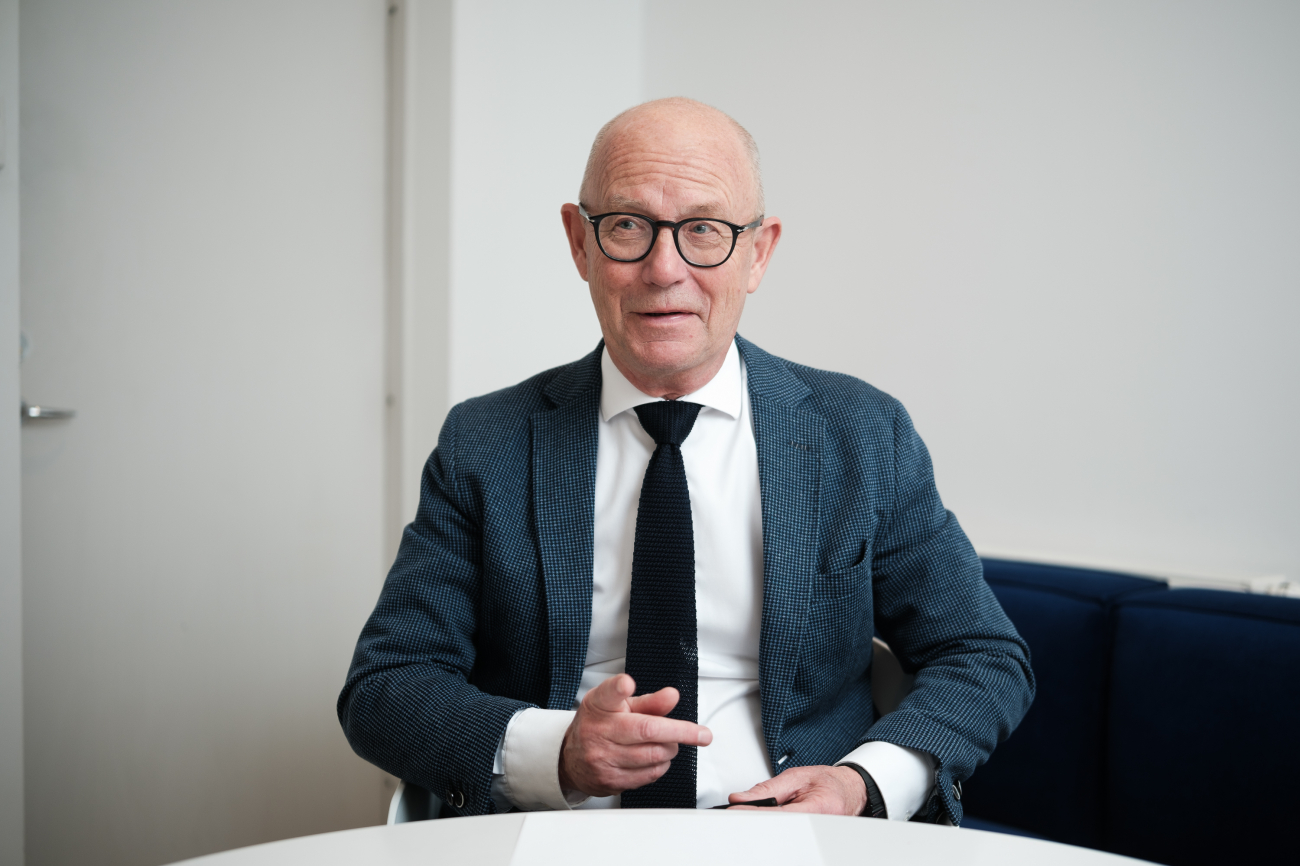 In the beginning, it was a question of humanitarian assistance, because there were not many windows that had not been shattered, because the Russians were shelling the city every day. It was very difficult to be there. So we bought enormous quantities of plywood for windows.
In the beginning, it was a question of humanitarian assistance, because there were not many windows that had not been shattered, because the Russians were shelling the city every day. It was very difficult to be there. So we bought enormous quantities of plywood for windows.
And there was no drinking water because the Russians had cut off the water supply from the Kherson. So we had to establish, together with our Ukrainian partners, 80 emergency water stations where you drill and tap water and this made it possible for the population to stay in the city otherwise people would have to leave the area.
We managed together with the local authorities to stabilize the situation so people could stay there, they could stay there during the winter of 2022/23.
Once that has been achieved, we could start the next phase and that's physical and social infrastructure, schools, gymnasiums, and all kinds of public institutions. And secondly, we worked on bringing back enterprises in operation. They don't want to be dependent on charity, they want to earn their own money and one of the problems was that lenders, banks, and financial institutions were not willing to lend any money to enterprises in Mykolaiv because it is close to the frontline.
So we had to establish a special window for our export credit and investment fund that can issue, for instance, export guarantees and loans even to companies on the front lines. And this has worked in Mykolaivю. And the interesting thing is that once Denmark did this, then other lenders said: okay, if the Danes can do it, we can do it as well.
So in that way, we have been pioneering lending in a war zone. This is something that we find important not only for Mykolaiv but basically throughout Ukraine because we hold the view that we cannot wait for peace.
Some people are saying, okay, reconstruction, that's fine, but we have to wait for peace. Once there is peace, then we need a big conference and a big plan. We say, no, we cannot wait for that. We have to start now. Ukraine cannot wait for it. This is, I think, the lesson learned in Mykolaiv that it's good to start while the war is still ongoing because that creates hope, that one day this nightmare will be over and there will be somebody who will help us. And this has, I think, created some optimism. We can see that people are returning to Mykolaiv.
In one of the small communities where we have supported a factory the mayor told me that if this factory is not operating, there is nothing to do in this city. And now that factory is working. And I can see whenever I go that there is a car outside many of the houses, I can see women coming down the street with a stroller and the school has reopened. It's very tangible, it's very concrete, it's something that makes a difference and that's what we want to do. We want to make a difference now, not when there is peace. We are urging other countries and financial institutions not to wait but to do something now.
– In fact, it is quite a popular opinion that there is little sense in reconstruction investment now, especially if we are talking about some big objects like thermal power plants – because the hostilities are still going on and Russians may destroy them once again anytime. And for the private sector especially it may be way too risky to make such an investment.
– There is a risk and probably it's a risk that is not possible for private lenders to assume on their own. Sovereign states would have to step in and this is what we have been doing, this is what we are urging other financial institutions to do, to make it possible to do something at this point, not to wait. It's important for Ukraine to keep the economy going, and to keep people in their jobs so they pay taxes. This is the philosophy that we have: don't wait, do it now.
– What are the top current Danish projects in the region?
– The Gymnasium named after Arkas. You've probably seen the photos of the entire front of that building that has been blown off. It's a historic building in the city center.
This is something we want to show: that this is possible to reconstruct and rebuild it. And this again will bring young people back. The other flagship is to rebuild the National University of Shipbuilding named after Admiral Makarov. This is also something that we were keen on.
When President Zelenskyy visited Mykolaiv back in November last year, this was what he said, one of his main messages, that we need to do something that will bring back young people because the demographics of the city are biased because many elderly people could not leave, who stayed on, so there is a lack of young people. The vision that both the mayor and the governor are sharing is that reopening the shipbuilding university will bring back 8,000 students.
We are also looking at infrastructure projects. One of the problems in Mykolaiv is that many trucks are passing through the city – the port is closed, so everything has to be on trucks. So there are thousands of trucks moving through the city, through the bridge across the river. So we have offered and we are looking into whether we can help establish a temporary ferry passing across the Pivdennyi Buh River that would mean that all the trucks would not enter through the city because it's polluting, it's destroying the roads. We are looking very much into economic activities that can be restarted so we are reaching out to local companies to see if we can help them.
– In some countries, in particular, the United States, there is a big issue with the accountability of the money they give to Ukraine. Some false narratives are spread by the opponents of Ukraine that all the money or nearly all the money is stolen because we are such a corrupted country. Are there such issues in Denmark? How do you deal with this?
– This is really the number one question I'm getting when I have some delegations coming here because, on the one hand, there is this strong support for Ukraine. On the other hand, there is this worry, this fear that maybe there will be a lack of accountability, there will be corruption, and whatever. So we are very, very conscious about mitigating the risk of corruption in our support.
For instance, all procurement we are doing in Mykolaiv is being done not locally. There is no local procurement, it is all being done through international organizations, primarily the UN system procurement agency. And this is one way of mitigating the risk of corruption.
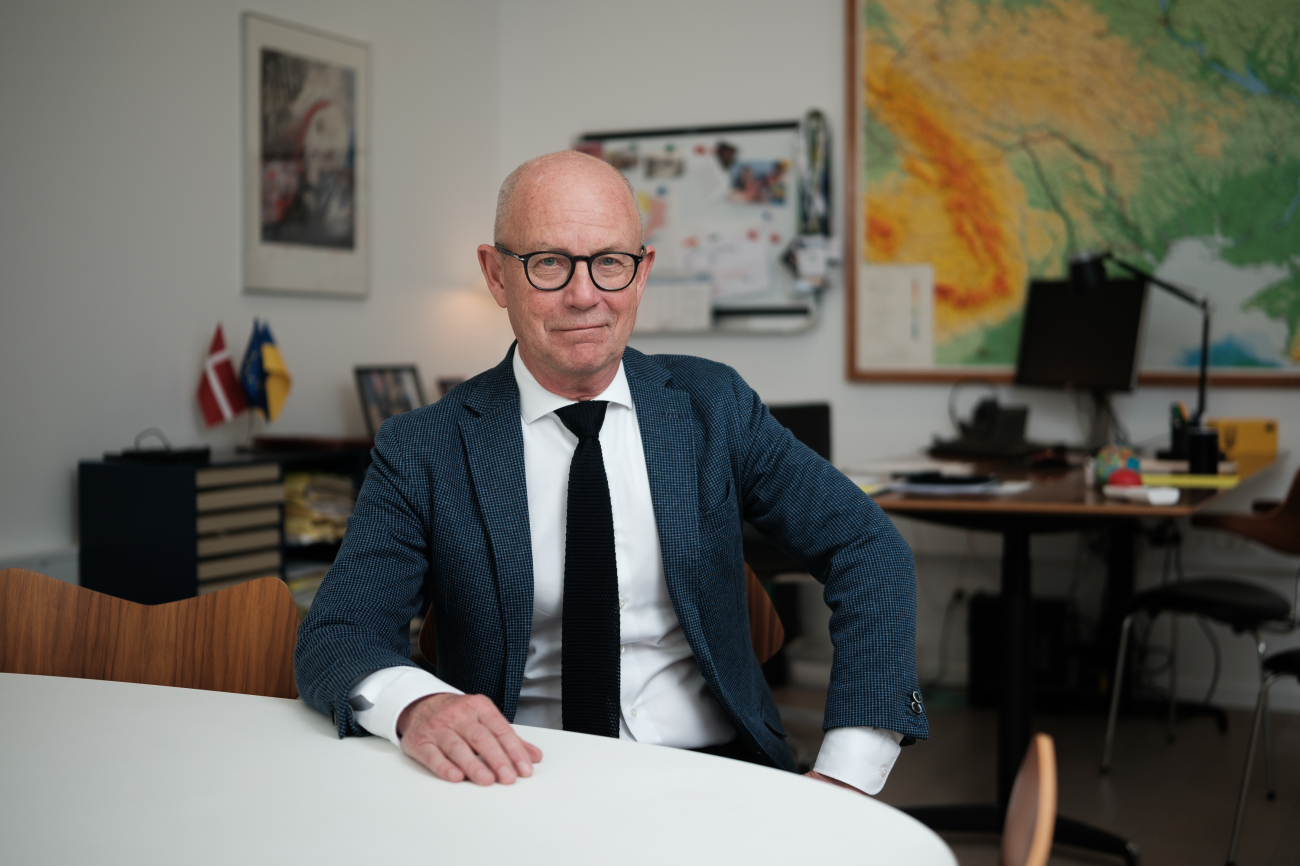 And we keep an eye on things. That is why we have an office in Mykolaiv. And Denmark is also implementing the European Anti-Corruption Initiative which has basically set up anti-corruption institutions. There is also a partnership with certain municipalities, they are called integrity cities and one of them is Mykolaiv, so they have to live up to strong requirements in terms of reducing the risk of corruption.
And we keep an eye on things. That is why we have an office in Mykolaiv. And Denmark is also implementing the European Anti-Corruption Initiative which has basically set up anti-corruption institutions. There is also a partnership with certain municipalities, they are called integrity cities and one of them is Mykolaiv, so they have to live up to strong requirements in terms of reducing the risk of corruption.
So it is an issue, it is something that is very high on the agenda. And the good thing is that we know that our Ukrainian partners are just as much aware of this as we are, and I feel a strong commitment in Mykolaiv, in Ukraine in general, to ensure that things are being done in a way that would not compromise integrity. You cannot mitigate the risk 100%, but you can do a lot, and we try to do that as much as possible because it would have a very negative impact on public opinion.
– If there is any real evidence of corruption?
– It would be the worst thing that could happen.
So, we have a strong and common interest with our Ukrainian friends to ensure that the fight against corruption is ongoing and that everything is being done to mitigate and reduce the risk of corruption.
– The US has finally unblocked a large aid package for Ukraine. In your opinion, will this give momentum for European countries to increase their assistance to our state? And in the end, does Europe expect that this aid will give tangible results on the battlefield in the foreseeable future?
– Look, I was on a train from Kharkiv on Saturday and I was there at the invitation of your Deputy Prime Minister Kubrakov, he invited a group of ambassadors to see with their own eyes what was happening. So on the way back on the train, suddenly we heard that something good happened and we were invited to celebrate with Minister Kubrakov and you could almost feel this collective sigh of relief. Everybody just said wow, now there's hope. And I think it's going to be a huge boost to the morale, not only in Ukraine.
I can feel that already when I'm talking to people, for the first time in a long time, they see something really, really good happening. And I think the same thing will happen in other European countries, especially those countries where there is a divided public opinion. Some people are saying, well, shouldn't we even try to stop this, Ukrainians, you guys have to negotiate. I think this is a very strong signal that the international community, the civilized world is united in support of Ukraine. So personally I'm very happy of course. Denmark has not been wavering at any point in time but I think the fact that our American friends have approved this aid package will have a huge impact.
– Do the Western partners of Ukraine have any other strategy besides supporting us 'as long as it takes'?
– I can only speak for Denmark, but I can tell you that there is no wavering. Nobody is saying, okay, this has taken long enough now, we need to find a peaceful solution. You would not find many Danes saying that. I think that Denmark is unique in the sense that we are just very much united in our support for Ukraine. So you shouldn't be worried about Danish support.
– We know what Denmark thinks of Emmanuel Macron's idea of sending military personnel to Ukraine. This is probably the only red line that your government is not ready to cross when it comes to supporting Ukraine. Did the very fact that such a discussion began benefit Ukraine? Like, we will not send troops, but here are the missiles.
– Look, my question is that what you need is equipment, what you need is weapons. And you still have a huge potential in terms of mobilizing manpower. So in terms of the Danish position, I don't see the issue of manpower as the biggest problem. But I think the fact that this idea is coming up, is reflecting the fact that many Europeans are worried about what will happen. So it's a sign that the mindset has changed. But of course, it's up to the French and to President Macron to explain and develop those thoughts further.
Russia's threat to NATO
– Do people in your country feel some sort of imminent threat coming from Russia as people in Baltic countries do, for example? Is this issue debated in the media, among experts, and politicians?
– I think that most people are confident that being a NATO member, and we have been a member of NATO for many years since 1948 so it's a long legacy and this has brought a feeling of security to our country. So most Danes are confident that being a member of NATO is the best possible thing for us. So I don't think there is a big worry, but people are aware that things are happening. Coming back to Kharkiv, that's a metropolis, a European metropolis in the heart of Europe, bombarded relentlessly, as I could feel when I was there.
And these things are not somewhere in Africa, this is not somewhere outside of Europe. This is Europe, this is our continent, this is where we live. This is in a country that in many ways is very similar to our own society. These are people having the same values, the same mindset, and the same ideas about their lives and their societies. So I think this is something that has been an eye-opener for many Danes, because we all thought, at least in my generation, that after the Cold War, there would be peace.
– 'The end of history'.
– Yeah, exactly. Now we have realized that this was not the end of history. It was just turning a page and now we are probably back to a situation that was not so different from what we had for many years during the Cold War.
– But having a hot war in Europe is perhaps making things even more complicated than back in the 80s when there was no such a war on the continent.
– It is, yeah. This is being covered extensively in Danish media, even now, after more than two years. It's an important part of what we're doing at the embassy – to make sure that this is on the radar, that this is not being forgotten, because so many things are happening in terms of things in the Middle East and elsewhere. But this is our own continent, this is our home.
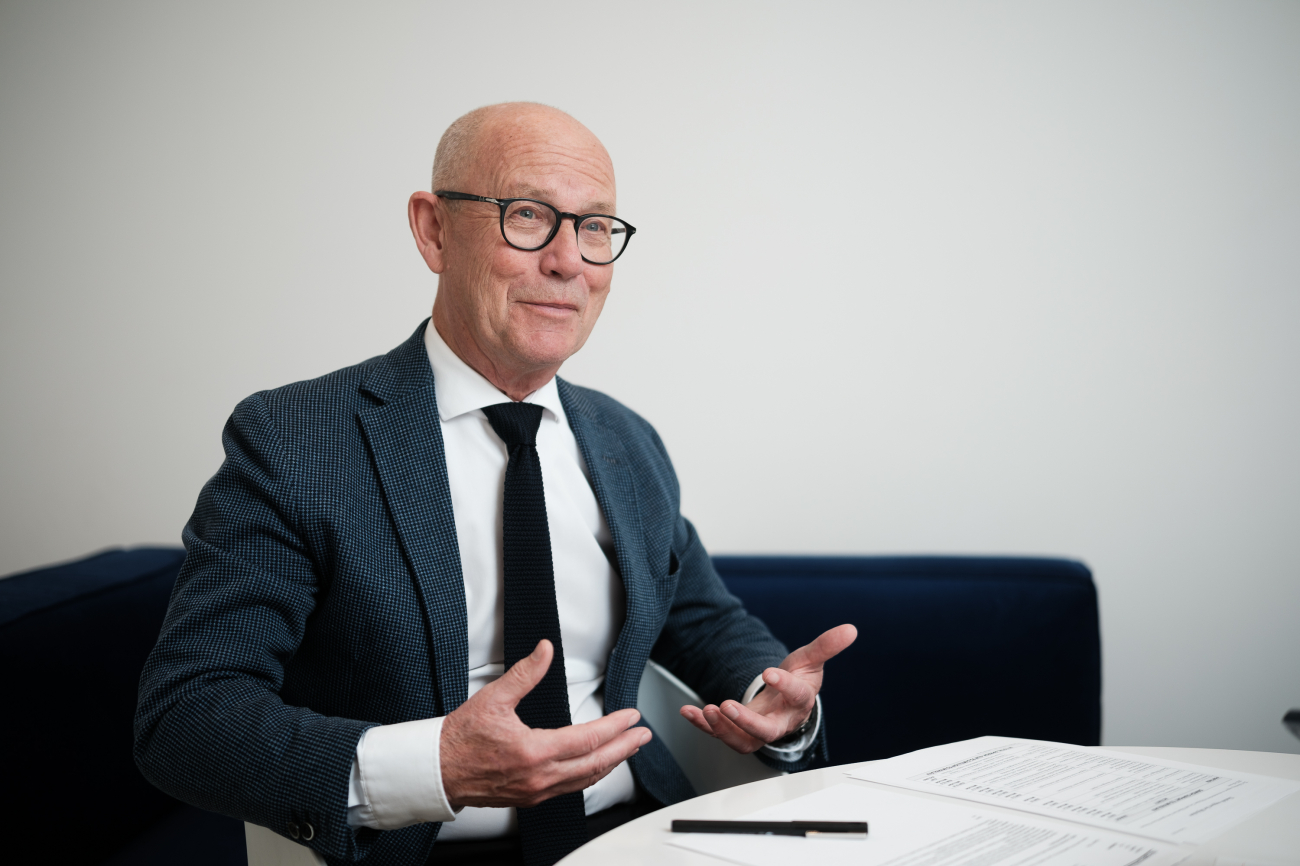
– Your Minister of Defense said not so long ago that Russia was rapidly re-arming and could attack NATO within 3 to 5 years. Does everyone in Europe feel this risk in the same way as, say, Baltic countries?
– I can only speak for Denmark. It started back in the 90s, during the Balkan Wars, in Bosnia in particular. This was also Europe, but that was a more original picture. It was harder to comprehend what was happening. Whereas here, there's no problem in comprehending what is happening. It's a crucial question.
And I think that has been an eye-opener for many Danes that, yes, this is possible, this is possible in Europe and we need to be prepared for it. That's why we are in a strong alliance, that's why we are members of the European Union, and that's why we are spending more and more resources on weapons and defense because we need to do that. And that's why we are supporting Ukraine big time because your security is also our security.
– What can Europe do to prevent further Russian aggression besides helping Ukraine to fight the enemy on Ukrainian soil? I mean increasing military spending and production is the obvious answer. But probably not all governments are ready to spend great amounts of taxpayers' money on defense because it may be hard to explain to the voters why we should invest this money in the production of artillery shells instead of investing them in schools or roads.
– For many years this was a dilemma, it was maybe difficult to explain to citizens, to taxpayers, that instead of building new hospitals, we should spend them on the military. But I think after what has happened here, it has dawned upon Danes that this is needed because if you cannot defend yourself, you cannot defend your freedom. So at the moment, we are increasing our defense spending dramatically and nobody is really questioning this.
– So people are okay with that?
– They have to. They have no choice. They are not happy. Sure, it would be better to build hospitals and schools. But they know that we don't have a choice. We need to invest in our own security.

